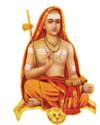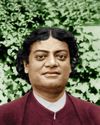
The Science of Vedanta
There are three fundamental ideas in Vedanta which appeal to scientific minds. These are:
1) Principle of Generalisation: The first principle of reasoning is that the particular is explained by the general, the general by the more general, until we come to the universal.... From humanity we generalise to animals, next to life, and at last to existence.
2) Principle of Evolution: That the explanation of a thing comes from within itself is completely satisfied by Vedanta. The Brahman has nothing outside of Himself. All this indeed is He: He is in the universe: He is the universe Himself. “The difference between man and man, between angels and man, between man and animals, between animals and plants, between plants and stones is not in kind, but only in the degree of manifestation.” That is the principle of evolution or greater manifestation.
3) Principle that Evolution is Cyclic:
This is the mind-boggling concept of evolution presented by Swami Vivekananda. Evolution is not linear but it is cyclic, for, that which evolves must have been involved earlier. The tree gets involved in the form of the seed; in the seed there is all that is required to evolve itself into a full-grown tree. And this process continues.
There are two more grand ideas which appeal to scientific minds. These are:
1) Solidarity of matter, of thought, and of spirit.
Bu hikaye The Vedanta Kesari dergisinin November 2020 sayısından alınmıştır.
Start your 7-day Magzter GOLD free trial to access thousands of curated premium stories, and 9,000+ magazines and newspapers.
Already a subscriber ? Giriş Yap
Bu hikaye The Vedanta Kesari dergisinin November 2020 sayısından alınmıştır.
Start your 7-day Magzter GOLD free trial to access thousands of curated premium stories, and 9,000+ magazines and newspapers.
Already a subscriber? Giriş Yap

Panchakroshi Parikrama of Varanasi
At the snow-capped Kailas, the Divine Lord Shiva was seated with Mother Parvati.

Gadai and the Monks
A fictional narrative based on incidents from the childhood of Sri Ramakrishna.

Chintayo momo maanosho Hori...
Sri Ramakrishna loved songs. There probably was no normal day when he did not sing some songs.

The Vedanta Vaccine
The world is still struggling under the impact of the pandemic due to Covid-19 for the last three years.

Chandrakirti's Chariot: Self in Madhyamaka Buddhism and Advaita Vedanta
The goal in Advaita Vedanta is the cessation of suffering and the attainment of true fulfillment. Suffering, according to this school, is due to ignorance of the true nature of the self and consequent erroneous identification with the body-mind.

Reminiscences of Sargachhi
Question: यद्यदाचरतत श्रेष्ठसतत्तदरेवरेतरो जनिः। ‘Whatever a superior person does, others do the same thing!’ (Gita 3:21) – What does this statement mean?

THE AUTUMN FESTIVAL
A fictional narrative based on incidents from the childhood of Sri Ramakrishna.

Bards of Guruvayur: Vilwamangalam II
Saints of India

In the Universal Mother’s Divine Playground
Swami Vivekananda never taught the worship of Mother Kali. In a letter to Mary Hale he writes, “Kali worship is not a necessary step in any religion.

Swami Vivekananda: A Sportsman Par Excellence
In various books and articles, Swami Vivekananda has been called a spiritual leader, a prophet, a patriot, a social reformer, a philosopher, a yogi, a writer, an orator, an educationist, a musician, and so on.